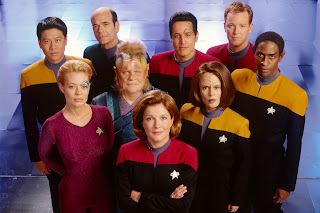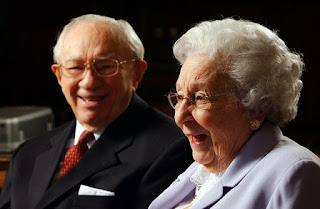1. Star Trek Trexels
This addictive mobile game is just what my Trekkie heart needed. Basically, you are an admiral in charge of staffing a Federation starship. You have to produce resources and spend them on away missions, training officers, and building rooms to make the ship function better. My favorite feature is the ability to add characters from the various Star Trek shows to your ship. My new goal in life is to recreate Voyager within this game. Plus, I play the role of an admiral. Help, I think I've died and gone to Star Trek Heaven.
2. Women and Entrepreneurship
I attended a lecture this month hosted by the Women's Services and Resources office at BYU. Jeanette Bennett, co-founder and editor of several Utah Valley magazines, spoke to us about how her experience as an educated mother drove her to start her own company. She gave us 11 tips on how to succeed and reach our dreams.
- Be positive. See the good.
- Be persistent. "Do the thing or bust!"
- Be passionate. Lose track of time because you love the work you do.
- Be excellent. Be hard to replace.
- Be present wherever you are. Minimize distractions.
- Don't take life too seriously.
- Defy logic if it's right for you. Act on revelation.
- Communicate with kindness.
- Feed your soul.
- Be you!
- Trust the Lord.
I never wanted to start a business before, but now I'm giving it serious thought. This line of thinking brings me to my next favorite...
3. The Oregon Trail Card Game
I love games, clearly. Never have I been so close to winning without actually winning, and that distinction is what I love so much about this game! Gameplay is similar to the computer games of ancient yore, with a few exceptions. There are a few things I would have adapted differently from the original games, which only makes me seriously consider starting a game-making business.
4. Recent Changes to My Calling
Why is this unusual subject one of my February favorites? Because attending the training kind of lit of fire in my brain. I walked away with renewed motivation, clear purpose, and new ideas on how to be a better Temple and Family History
missionary. That's right: one of the main changes in my stake is that my committee members are now labeled as missionaries, which is exactly what we are for the dead. I have so many ideas to spread the spirit of Elijah; I'll keep you updated on what works.
5. Asset Enrichment Service
A post showed up on my Facebook feed the other day and it directed me to a
service opportunity I had never heard of. A few years ago, the Church put out a call for user submissions of writing, art, and photography. Now that they have received thousands of submissions, the Church needs help tagging these resources for people to easily find and use. Basically, you are given a photo with a title and description, and you get to suggest tags that may apply to the photo. It's incredibly easy and fast, but it's clearly a massive project. Crowdsourcing only works with a crowd, right?
Also, as I took the screenshot for this blog post, I couldn't help myself. I had to tag a few pictures before I returned to blogging. It's a little addicting.
6. Writing Excuses Podcast
Because I spend so much time listening to audiobooks, I rarely listen to podcasts. However, the
Writing Excuses podcast is the one I return to again and again. The presenters are concise, funny, honest, and brilliant (though they claim to be "not that smart" at the beginning of every podcast). They give excellent advice and writing prompts. When I'm in a writing slump, I simply listen to a single episode of Writing Excuses, and it rekindles my passion for writing.

































